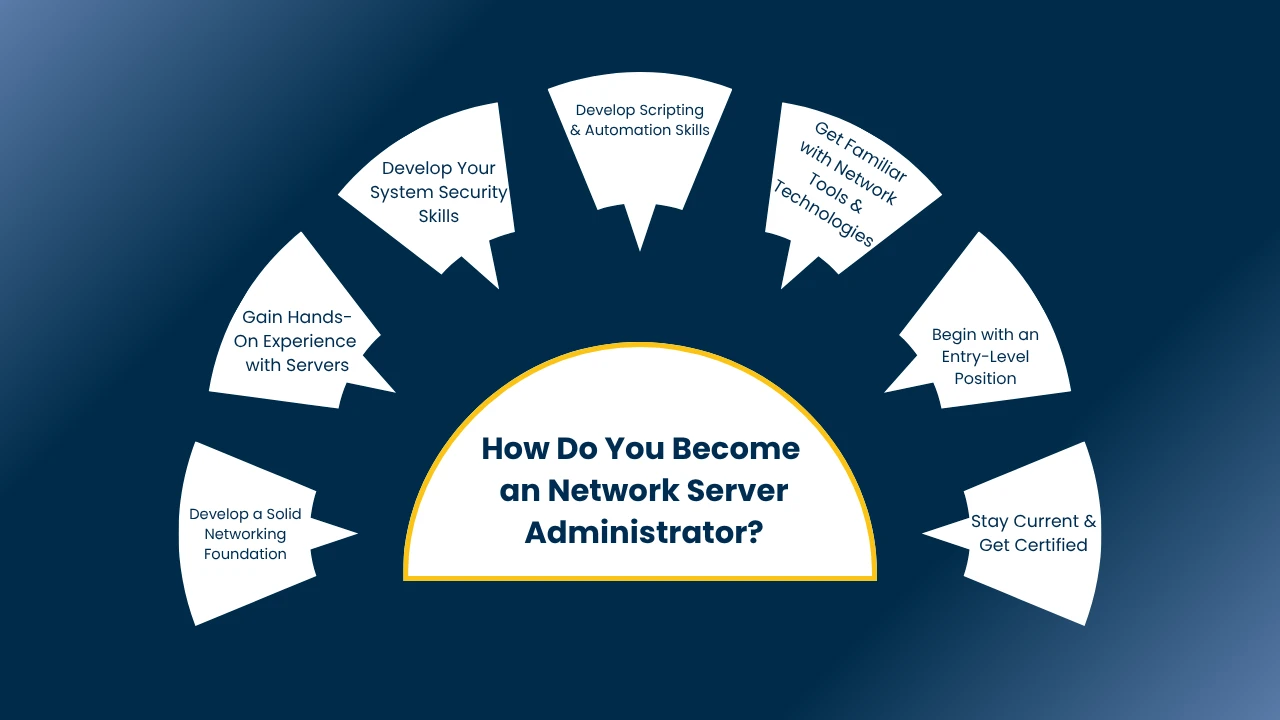How to Be a Network Server Administrator After cPent Certification

In the globally connected digital world we live in today, enterprises are dependent upon secure and sturdy network infrastructures in order to operate effectively. Network Server Administrators work quietly behind the scenes to ensure such systems operate reliably, securely, and without issue. If network and server passion burns within, transitioning into this role can prove to be rewarding on both professional and financial fronts.
One of the best methods for starting or turning into this line of work is by certifications which confirm your expertise particularly advanced ones such as CPENT (Certified Penetration Testing Professional). At Orbus (Cybersec Trainings), we facilitate bridging between certification and professional life with interactive training that positions you for practical roles in IT. Here, we will guide you through what it takes to be a Network Server Administrator, what skills you will require, where CPENT certification comes into the picture in your career, and how Orbus can assist you in reaching your career aspirations.
What is a Network Server Administrator?
A Network Server Administrator is an Information Technology specialist charged with the responsibility of maintaining a company’s network infrastructure and servers. Their primary duties include system and hardware and software maintenance, system reliability, and implementing security to safeguard data. They analyze network problems, set up systems, and look for performance monitoring to ensure day-to-day business operations are unhampered. Simply put, they ensure all things remain interconnected, secure, and operational behind the scenes.
What Do Network Server Administrators Do?
Network Server Administrators ensure that the networks and servers of an organization function smoothly. Their routine job usually involves:
- Installing, setting up, and maintaining network equipment such as routers, switches, and firewalls
- Setting up and maintaining virtual private networks (VPNs)
- Monitoring server and network performance to ensure maximum uptime
- Resolving connectivity and hardware/software problems
- Maintaining network security by means of access controls and technical countermeasures
- Working with departments and preparing thorough technical reports
- Keeping storage networks and backup systems up-to-date and improved
- Helping IT budget planning for network infrastructure
- Supporting and installing system enhancements and upgrades
- In most penetration testing companies, their work is closely associated with systems administrators, particularly with the handling of overall IT infrastructure.
10 Best Key Skills Required for Network Server Administrator
To be effective as a Network Server Administrator, you must possess a strong combination of technical competencies and interpersonal qualities. These are the most important ones: Problem Solving & Troubleshooting: Capacity to rapidly identify and correct network or server problems, frequently under deadlines.
- Technical Proficiency: Strong comprehension of networking standards, server equipment, and IT infrastructure.
- Network Security: Familiarity with cybersecurity methodologies to protect systems against threats and weaknesses.
- Server & OS Management: Configuration and maintenance of servers, as well as experience with Windows Server and Linux operating systems.
- Scripting & Automation: Knowledge of task automation with scripting tools such as PowerShell, Bash, or Python.
- Virtualization & Cloud Computing: Knowledge of virtualization tools such as VMware and cloud environments such as AWS or Azure.
- Performance Monitoring: Skill to monitor and analyze system and network performance.
- Attention to Detail: Essential to identify configuration mistakes or possible security vulnerabilities.
- Communication Skills: Clear and concise communication, especially while working across teams and with non-technical staff.
- Organizational Skills: Strong ability to handle multiple systems, tasks, and documentation effectively.
- Certifications & Knowledge Base: Certifications such as CCNA that confirm basic networking skills.
Also Read: 16 Must-Have Tools for Network Administrator in 2025
How Do You Become an Network Server Administrator?
The CPENT (Certified Penetration Testing Professional) certification is famous for developing expert-level cybersecurity and ethical hacking expertise—but its utility doesn’t stop at penetration testing in cyber security positions. Actually, if you want to become a Network Server Administrator, CPENT can be a great launchpad. Here’s how you can use your penetration testing certification to get into this position:

1. Develop a Solid Networking Foundation
While CPENT refines your attack skills as well as defenses, keep in mind that you also need to be well-versed in fundamental networking—IP addressing, routing, switching, and protocols. These concepts form the basis of configuring and running network infrastructure.
2. Gain Hands-On Experience with Servers
Get familiar with server operating systems such as Windows Server and Linux. Learn to install, configure, and manage server environments. Hands-on labs, simulators, or home labs can be very useful in this case.
3. Develop Your System Security Skills
You already have a strong foundation in system vulnerabilities and attack vectors with CPENT. Leverage that knowledge to deploy tighter network defenses, harden servers, and apply access controls all important functions for server administrators.
4. Develop Scripting & Automation Skills
Today’s server admins automate repetitive tasks in order to increase efficiency. Learn scripting languages such as PowerShell (for Windows) or Bash (for Linux) to automate processes and enhance system administration.
5. Get Familiar with Network Tools & Technologies
Begin learning about firewalls, VPNs, IDS/IPS, virtualization software (such as VMware), and cloud infrastructure (such as AWS or Azure). A Network Server Administrator should be familiar with a variety of these technologies.
6. Begin with an Entry-Level Position
Search for positions such as IT Support Technician, Junior Network Administrator, or System Analyst. These roles provide you with the experience needed to move into a dedicated server admin position.
7. Stay Current & Get Certified
Even though CPENT is a good credential, add certificates such as CompTIA Network+, Microsoft Certified: Windows Server, or Cisco CCNA as complementary additions to it. They will deepen your network credentials as well as enrich your skills portfolio.
What are the Certifications for Network Server Administrator?
Certifications are a major way of confirming your expertise and gaining more credibility as a Network Server Administrator. Whether beginning or upgrading, below are some of the most beneficial certifications to pursue:

1. Cisco Certified Network Associate (CCNA)
The CCNA is among the best-known certifications for network administrators. It addresses basic networking concepts such as installation, configuration, troubleshooting, and security. There are no prerequisites, so it is perfect for newcomers who want to establish a solid foundation in network administration.
2. CompTIA Network+
This vendor-agnostic certification targets vital networking principles such as network configuration, design, device management, and troubleshooting. It’s a solid introduction to those interested in becoming network admins and is heavily valued within the IT sector.
3. Certified Network Computer Technician (CNCT)
Provided by ETA International, this certification illustrates your knowledge in the areas of computer electronics fundamentals, operating systems, and networking technologies. It is a good choice for people wishing to do work in positions dealing with hardware and infrastructure maintenance.
4. Cisco Certified Technician (CCT)
CCT attests to your competence in identifying and fixing Cisco network devices. You can become certified in specializations such as Routing and Switching, Data Center, or Collaboration, according to your desired area of study.
5. Cisco Certified Network Professional (CCNP) Enterprise
This advanced-level certification confirms knowledge of enterprise-level network solutions. It consists of two exams: one on core networking technology and the other on your selected concentration such as SD-WAN, enterprise design, or wireless solutions.
6. Microsoft Certified: Azure Administrator Associate
This certification is centered on the management of Azure environments, such as networking, identity, and security in Microsoft’s cloud platform. It’s a good asset for administrators in hybrid or cloud environments.
7. Microsoft Certified: Azure Security Engineer Associate
Best suited for those with a bias towards network security, this certification addresses threat protection, securing networks, identity management, and scripting in Azure. It’s a good credential in today’s cloud-oriented environments.
8. Red Hat Certified System Administrator (RHCSA)
For Linux-based environments professionals, RHCSA is a requirement. It certifies your competency to perform necessary system administration operations like installing and setting up Red Hat Enterprise Linux systems and handling network management.
9. Network 5 – EC-Council
The Network 5 certification from the EC-Council showcases your understanding of networking basics and network infrastructure. It’s for candidates who plan on working in the field of network operations and cybersecurity.
10. VMware Certified Professional (VCP)
It is best for professionals dealing with virtualized infrastructures. Paths are Data Center Virtualization, Network Virtualization, Cloud Management, and Security. It is an excellent platform to highlight your expertise in handling contemporary IT infrastructure.
11. Microsoft Certified: Solutions Architect Expert
Targeted at senior professionals, this certification demonstrates your ability to design and manage intricate solutions on various Azure environments. It’s ideal to pursue after gaining practical experience and obtaining associate-level Microsoft certifications.
12. Pro: Windows Server 2008, Enterprise Administrator
While a bit old, this certification still holds up for professionals operating in older Windows Server environments. It demonstrates your ability to manage Windows enterprise-level infrastructure.
These certifications not only allow you to confirm your skills but also provide new career prospects in server and network administration. Based on your existing level and career aspirations, select the one that best suits your path.
What is the Salary of a Network Server Administrator?
The salary for a Network Server Administrator in India is around ₹5,00,000 per annum, as given by Glassdoor. Salaries can differ widely depending on experience, designation, company type, and place. Even senior persons with extensive experience may receive more than ₹8,40,000 each year, particularly in metropolitan cities or with premier technology companies.
Read More: How to Become Security Engineer after doing Pent Certification
How Orbus Can Help in Becoming a Network Server Administrator?
At Orbus (Cybersec Trainings), we offer industry-relevant, CPENT-aligned training courses that give learners the hands-on skills and expertise necessary to be a successful Network Server Administrator. Our penetration testing course is designed by experts, presented with real-world examples, and developed to meet industry expectations. Here’s a brief rundown of our program:
| Features | Information |
|---|---|
| Core Focus | Cybersecurity training, IT recruitment, and consulting. Provides essential security knowledge for server professionals. |
| CPENT Certification | Advanced penetration testing certification. Equips administrators to identify and mitigate server vulnerabilities. |
| Cybersecurity Skills | Vulnerability assessment, incident response, network security. Crucial for securing modern server environments. |
| Direct Server Admin Training | Not a primary focus. Cybersecurity skills enhance server administration capabilities. |
| Fees and Duration | Varies depending on course. Contact Orbus International directly for current pricing and schedules. |
| USP’s | Practical, real-world skills. Industry-recognized certifications. “Hire, Train, Deploy” solutions. Cybersecurity focus. Experienced consultants. Provides valuable benefits to those seeking to advance their cyber security knowledge, which is very useful for server administrators. |
Conclusion
To become a Network Server Administrator isn’t simply to know how to set up servers or fix problems it’s to know the larger context of IT infrastructure, security, and performance. With the right combination of skills, certifications, and hands-on experience, you can establish yourself as a sought-after professional in a high-growth field.
The CPENT certification provides you with a strong foundation in offensive security, and when coupled with specialized training—such as the courses at Orbus you can be sure to make your next move into this exciting line of work. If you are just starting out, or upskilling from another position in IT, the choice is yours to make.
Understand how Orbus can help your career!
Speak with an Expert Now!
FAQ's
What are the qualifications to become a Network Administrator?
To be a Network Administrator, a bachelor's degree in Computer Science, Information Technology, or any related discipline is generally desired. But numerous professionals come into the profession with applicable certifications and practical experience, even without an official degree.
What is the qualification for a Network Administrator position?
Although a degree is usually preferred, eligibility can be achieved through sound foundation knowledge in networking, related certifications (such as CCNA or CPENT), and hands-on experience with network systems and infrastructure.
How do I become a Server Administrator?
Begin by establishing a strong foundation in IT or computer science. Gain hands-on experience through internships or entry-level positions, and obtain certifications like CompTIA Server+, Microsoft Certified Solutions Associate (MCSA), or VMware certifications to enhance your technical skills.
How much is the salary of a CPENT certified professional in India?
A Certified Penetration Testing Professional (CPENT) in India may earn between ₹4.5 LPA at the entry level to ₹29.2 LPA at the senior level. On average, CPENT-certified penetration testers earn between ₹10–35 Lakhs per year, based on experience, position, and employer.




